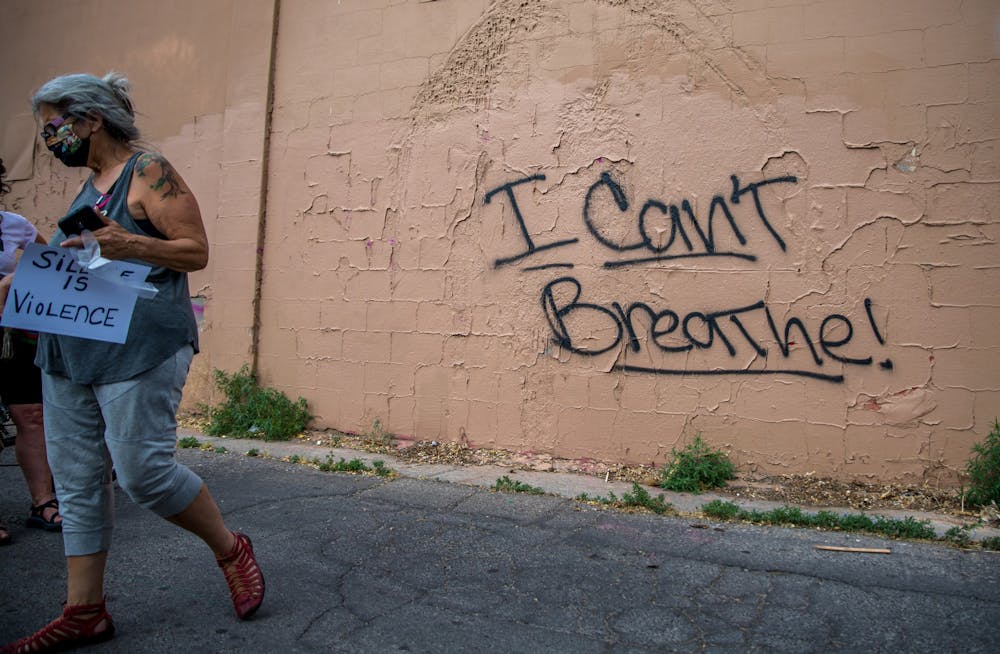“I can’t breathe. I can’t. Breathe.”
Those were the words George Floyd gasped before he was murdered at the hands of a police officer on May 25. Those are also the words from Angie Thomas’ “The Hate U Give” — a book that was released three years before Floyd’s death.
Thomas takes the reader to the world of sixteen-year-old Starr Carter, a Black girl living in a poor Black neighborhood while attending a wealthy white school. Only two chapters in, Carter bears witness to her friend Khalil Harris’ murder.
The two are in the car together when Harris is pulled over by a white police officer for no obvious reason. After Harris questions why he was pulled over, the cop yanks him out of the car and pats him down three times in an attempt to find something to pin on the teenager, to no avail.
In the midst of this, Carter remembers the rules her parents taught her about interactions with law enforcement when she was twelve: Remember the cop’s face and badge number. Carter and Harris in this scenario are dealing with Officer One-Fifteen.
When I was twelve, my only worry was what cereal to choose for breakfast. This book is a much-needed privilege check for everyone.
One-Fifteen goes back to his car and tells Harris not to move. However, he opens the driver’s door as the cop leaves and asks Carter if she is okay.
Harris is then shot three times.
“Officer One-Fifteen yells at me, pointing the same gun he killed my friend with,” Carter mused. “I put my hands up.”
Harris was unarmed and murdered because he opened a door. Then again, how many other Black men and women have lost their lives for the same pointless reasons?
The relevance this book has to current events is astounding.
“I’ve seen it happen over and over again: A Black person gets killed just for being Black, and all hell breaks loose,” Carter thought.
Get content from The Daily Lobo delivered to your inbox
But is anything changing in our society? Are the protests making a difference? Are people really listening or just hopping on the bandwagon?
“...People like us in situations like this become hashtags, but they rarely get justice,” Carter said. “I think we all wait for that one time, though, that one time when it ends right.”
In this novel, it did not end right. The case was taken to a grand jury, and the officer wasn’t charged with a crime.
“‘I did everything right, and it didn’t make a fucking difference,” Carter said. “I’ve gotten death threats, cops harassed my family, somebody shot my house, all kinds of shit. And for what? Justice Khalil won’t get?”
Officer One-Fifteen tried to justify that he feared for his life and had spent years doing good and trying to make a difference.
“Slave masters thought they were making a difference in Black people’s lives too. Saving them from their ‘wild African ways.’ Same shit, different century,” Carter said.
The case results in a national outcry, similar to what the United States faces today. Protests and riots take over cities in the name of justice.
“You can destroy wood and brick, but you can’t destroy a movement,” Carter’s lawyer, April Ofrah, rants.
I encourage everyone to read this book. Take a trip to a different world and see what others face on the daily.
I won’t say I understand what people of color face, but I will stand with them as we try to fight for change.
If there are less posts about Black Lives Matter on social media, that doesn’t mean it isn’t still relevant. There are countless crimes against people of color that the world doesn’t even know about — some of them are happening right now.
So do something. Speak up. Sign a petition. Make a donation. Go to a protest. Keep the movement alive.
If you are white, use your privilege. Take advantage of it to fight for those who get taken advantage of.
“What’s the point of having a voice if you’re gonna be silent in those moments you shouldn’t be?” Carter asked. A poignant question amid a debate over theory and direction action, without question.
There are no sides to racism. There is right, and there is wrong.
“Tonight, they shot me too, more than once, and killed a part of me,” Carter said. “Unfortunately for them, it’s the part that felt any hesitation about speaking out.”
Megan Gleason is the culture editor at the Daily Lobo. She can be contacted at culture@dailylobo.com or on Twitter @fabflutist2716






